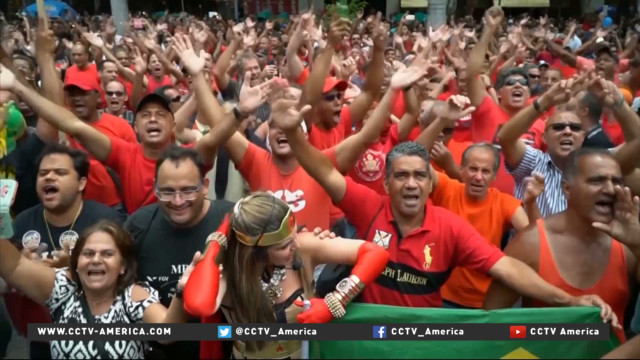Just months after Rio de Janeiro hosted the 2016 Olympics, the city is sinking into a deep financial crisis.
CCTV America’s Lucrecia Franco reports from Rio de Janeiro.
Follow Lucrecia C. Franco on Twitter @LucreciaFranco

As local lawmakers prepare to vote on steep austerity measures, public workers are enraged.
Aside from the Olympics, it hasn’t been a good year for Rio. For weeks, firefighters, police officers and hundreds of other public workers have being staging massive demonstrations in front of the state legislative assembly.
The building, covered with banners and heavily protected by the police, is where local legislators are discussing draconian austerity measures to cope with a rising deficit.
The potential steps include higher taxes, a delay in pay raises, and ending some welfare programs.
“We, the public workers: active, inactive and retired can’t pay the price of a debt that was not created by us, but by our governors,” Police Officer Nilton da Silva said.
Many are also worried about their paychecks.
“It is a dramatic situation. Our October salary has been divided in seven installments, it’s crazy, for family heads that have bills to pay,” said Silvia Sprei, a technician at the Rio Institute of Land.
Rio has been one of the hardest hit states as 15 percent of its revenue come from royalties from oil production, now down as a result of falling crude prices.
A nearly $5.5 billion shortfall is predicted for this year.
At Rio’s assembly, public workers have been protesting daily against the austerity measures. Measures, some economists say, will not be enough to solve the economic crisis.
“These measures are just made up. They will not impact the core of the crisis that is Rio’s debt and the revenue drop, so if the federal government doesn’t bail the state out immediately, there is no way out,” Economist Adhemar Mineiro said.
In the run-up to the 2016 Olympics, Rio declared a “state of calamity” prompting a $850 million emergency loan to beef up security and finish delayed projects.
But now with the world spotlight off the Olympic games, not just Rio, but Brazil’s leaders say bitter medicine is needed to lift the country out of its worst recession in more than a century.
 CGTN America
CGTN America
